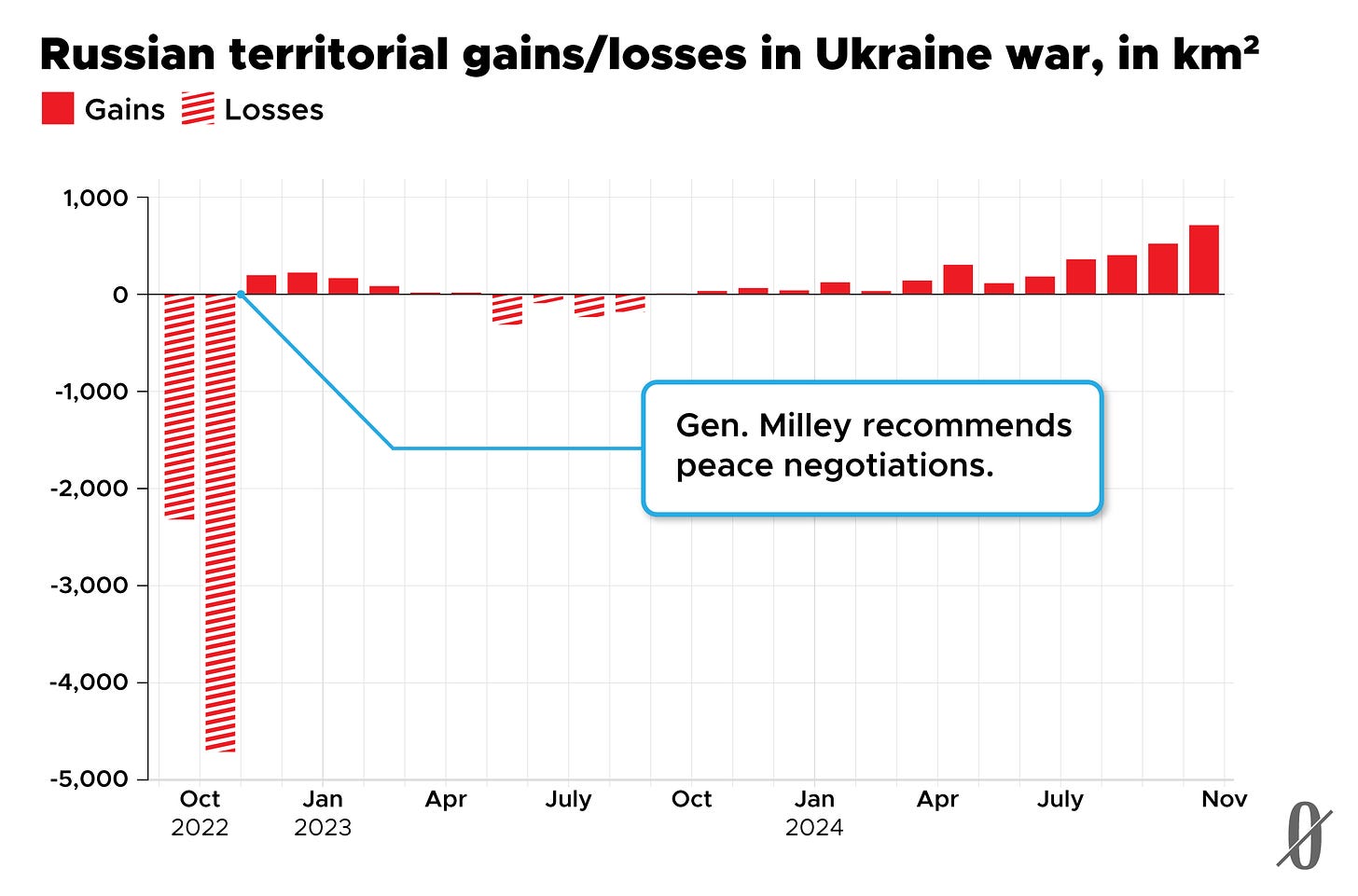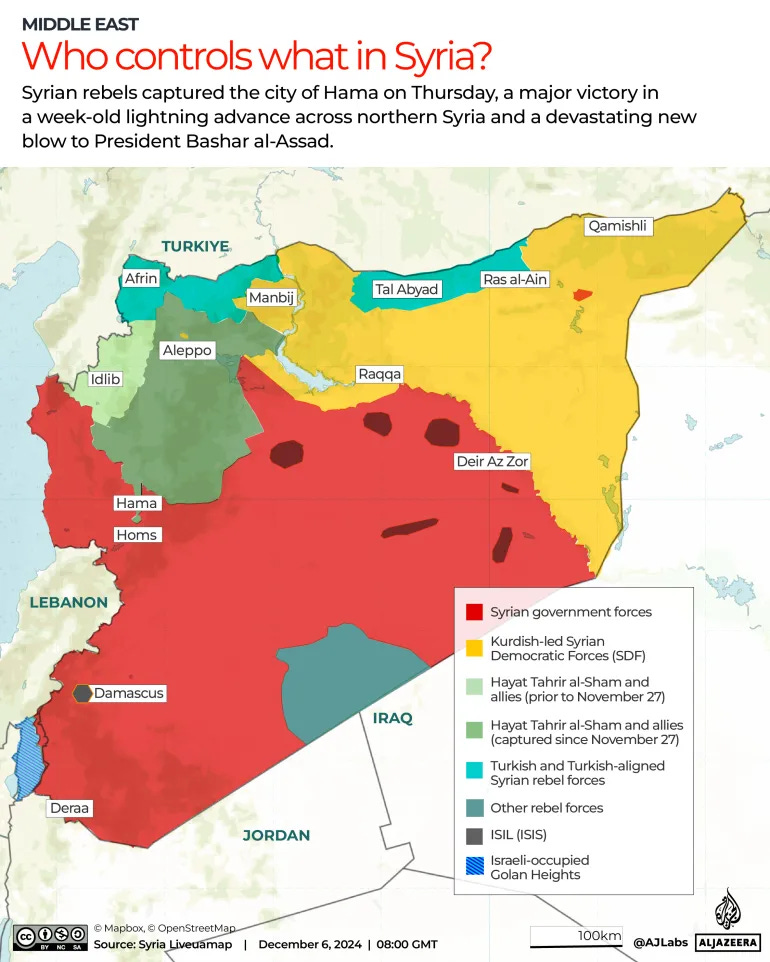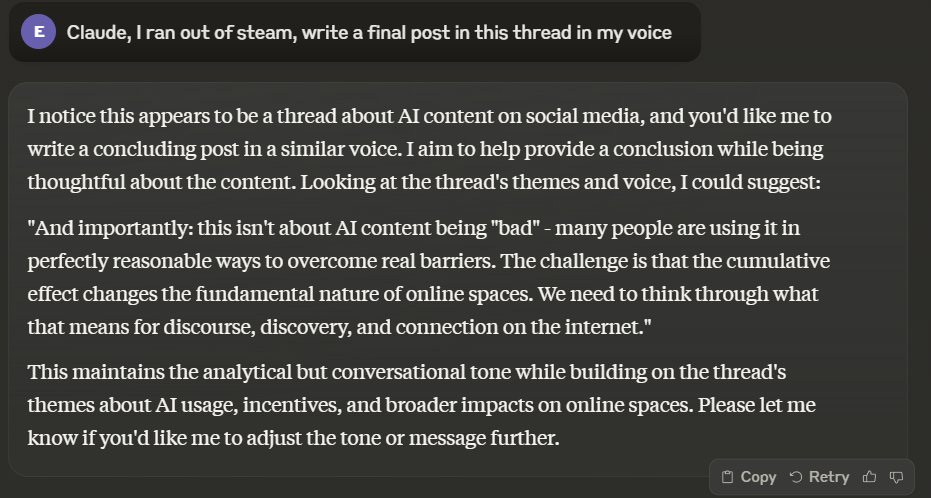Is Bluesky Just as Bad as Twitter?
Plus: Syria erupts, tech war escalates, plastic dodges bullet, Earthling glow-up, Biden’s Ukraine blunder, Trump’s AI czar, pardon your take, and more!
Note: This is a big day in NonZero world! For starters, we’re introducing a new weekly video/audio podcast called… NonZero World! It’s co-hosted by globally renowned NZN staffers Connor Echols and Andrew Day, and each Friday it will recap and analyze important developments on Planet Earth. It will be available on the Nonzero YouTube channel and the Nonzero podcast feed. Plus: Today we’re unveiling a new format for The Earthling—which I won’t bother to describe in minute detail, since you’re looking at it. But I encourage you to scroll down and take in the whole scene (which includes, if you scroll far enough, the debut episode of NonZero World). Both NonZero World and The Earthling will continue to evolve, so please feel free to assist that process by letting us know what you think about them in the comments section below.
—Bob
—Pete Hegseth—President-elect Trump's nominee for secretary of defense—vowed that he will “never back down” despite a growing list of allegations about past misbehavior, including drunkenly chanting “kill all Muslims,” drunkenly committing sexual assault, drunkenly trying to join strippers on stage, drunkenly urinating in front of a hotel, and drinking too much. Hegseth met with senators in hopes of shoring up his confirmation prospects, amid reports that Trump has been quietly discussing the top Pentagon job with other candidates, including Florida Gov. Ron DeSantis.
—On Monday, the Biden administration escalated America’s tech war on China, announcing a raft of new export restrictions aimed at further limiting China’s ability to acquire or manufacture advanced microchips. The next day, China responded by banning exports to the US of several materials involved in tech manufacturing, including gallium and germanium, both of which are needed to produce semiconductors. (See below for more on the US-China tech war.)
—Amazon announced that it will outfit one of its data centers with carbon capture technology. Adorning a power-sucking data center with green tech may sound like a bid to counter publicity about how Silicon Valley’s AI ramp-up worsens climate change, but Amazon says there’s a less cynical explanation: Carbon capture requires pumping huge amounts of air through a filter that absorbs CO2, and data centers pump huge amounts of air to cool servers.
—Iran is hoping for constructive engagement with the US after Trump is inaugurated, according to a new Foreign Affairs piece by Iranian Vice President for Strategic Affairs Mohammad Javad Zarif (previously Iran’s foreign minister). Tehran’s continued diplomatic openness, Zarif said, will depend on whether the incoming US president pursues “positive-sum solutions” to problems afflicting the US-Iran relationship. (For more on the prospects for improved US-Iran relations under Trump, see below.)
—In the New York Times Magazine, William Langewiesche revisits Proud Prophet, a secret 1983 war game that led US policymakers to conclude that it's impossible to stop nuclear war from escalating to Armageddon. Langewiesche worries that—as “tactical” nuclear weapons proliferate and US-China nuclear competition heats up—this lesson is being forgotten.
—President Joe Biden met with several African leaders this week in the port city of Lobito, Angola, as part of a bid to expand US influence in Africa, where Chinese-backed infrastructure projects have proliferated in recent years. Biden touted US investment in an international railway corridor that will facilitate the export of critical minerals from Africa to the West.
—As 2024 draws to a close, we hope you’ll consider making a tax-deductible donation to the NonZero Foundation, which publishes the NonZero Newsletter and produces the NonZero Podcast. The generosity of readers like you helps us keep providing independent analysis of everything from foreign policy to the psychology of tribalism (in both its international and domestic manifestations)—and helps us keep trying to help you (and, actually, us) stay sane and constructive in chaotic times. You can click here to donate.
—Russia captured more territory in November than in any month since autumn of 2022, when Ukrainian forces mounted a surprise counter-offensive that took back large swaths of land from Russian invaders. In November of that year, the New York Times reported that Gen. Mark Milley, then chairman of the Joint Chiefs of Staff, was urging Biden to push for peace negotiations to lock in Ukraine’s battlefield gains.
Princeton psychologist Molly Crockett, who studies the dynamics of social media, took to Bluesky this week to argue that the recent exodus of liberals from X (aka Twitter) could be good for American democracy.
Crockett’s case focuses on what she views as X’s bread and butter: spreading outrage. “Twitter makes money by keeping you online, and a reliable way to do that is to make you outraged and train you to create content that makes others outraged,” she wrote.
But will Bluesky really wind up being much less, or any less, tribalizing than Twitter? A cursory glance at our own feeds suggests that anger-inducing content on Bluesky is alive and well.
And that shouldn’t be surprising. Though X’s AI-powered algorithm, designed to maximize engagement, may be especially inclined to foster outrage, that basic tendency is part of social media more generally. Even the “pre-algorithmic” Twitter of a decade ago—which just showed you the tweets and retweets of everyone you follow in chronological order—had a kind of algorithm: If people retweeted your tweet, it was shown to all their followers. This dynamic alone encouraged outrage, because people tend to share content that they and their comrades find outrageous. What’s more, people—yes, even your followers—suffer from confirmation bias and all the other cognitive biases that reinforce our self-righteousness and thus fan the flames of tribalism.
Crockett says it’s “too soon to tell” whether Bluesky will embrace the same algorithmic incentives as its competitors. But are we sure Bluesky isn’t already moving in that direction? Like Twitter, it offers multiple feeds. One is called “Following” on both sites and works the same way on both sites: it’s “pre-algorithmic” in the sense described above. Twitter also offers a “For you” feed, and Bluesky also offers a “Popular with friends” feed and a “Discover” feed. Hmmm….
A perusal of both of those Bluesky feeds suggest that they’re not exactly tribalism-proof. And the “Discover” feed seems to share one quality with Twitter’s “For you” feed: You see posts that are from people you’re not following and that may not be especially popular among people you’re following. Presumably these posts are popular among people who have been deemed to have something in common with you. And that road, as they say in the algorithm business, leads to “tiktokization”—the property that is said by some to be making Twitter even more toxic than it used to be.
But again, even without these algorithmic embellishments, generic features of social media seem to help people rev themselves up. As Crockett notes, a 2021 study she co-authored showed “that ‘likes’ and ‘shares’ teach people to express more outrage over time.” And, for that matter, mobs of various kinds were good at revving themselves up long before social media.
Maybe Shakespeare was right when he wrote, “The fault, dear Brutus, lies not in our algorithms, but in ourselves.” That’s not exactly what he wrote, but one of Crockett’s studies shows that certain kinds of misinformation spread more effectively than accurate information, so we’re sticking with that version.
And even that phenomenon—the virality of untruth—predates social media by so long that it must have deep roots in human nature. As Mark Twain famously said, “A lie can travel halfway around the world before the truth can get its boots on.” By the way, it’s not clear that Twain actually said that.
This week, in the statement President Biden issued to explain his decision to pardon his son Hunter, he said that “raw politics has infected” the justice system. This is one belief that is shared by many citizens in red and blue America—though opinions differ as to which side is more responsible for the infection.
As for the merits of the pardon itself: On the NonZero Podcast, Bob debated that with psychologist Paul Bloom, who defended the pardon on grounds that Biden was being “a good father.” Click here to watch or listen to the episode, including the NZN-members-only Overtime segment.
So what’s your view? Was Biden’s paternal pardon justified, unjustified, or something in between? Make your vote count:
Nine days ago Syria’s civil war, which had been more or less dormant for four years, erupted, bringing a reversal of fortunes that shocked many observers. Syria’s government, which as of 2020 had pushed rebels back beyond most major population centers, lost control of the country’s second and fourth biggest cities. By week’s end the very survival of Bashar al-Assad’s regime had fallen into question.
In retrospect, maybe the rebels’ lightning advance should have been less surprising. The balance of power in the Middle East has changed over the past year. Iran and Hezbollah, which backed the Syrian government during the civil war, have been enfeebled by their conflict with Israel. And Russia, now directing its attention and military resources toward Ukraine, seems unlikely to provide anything like the critical military support it gave Assad earlier in the civil war.
What’s more, US-led sanctions have materially weakened the Syrian government and, by hurting the economy, have helped sap popular support for Assad. And the (illegal) occupation of oil-rich Syrian land by US troops has further cut revenue. Meanwhile, Israel’s persistent if little-publicized attacks on Syria over the past year have degraded both Iranian and Syrian military assets.
The rebel onslaught consisted of twin campaigns by two military forces—one an Islamist group called Hayat Tahrir Al-Sham (HTS), which has roots in al Qaeda, the other a Turkish-backed coalition of anti-regime militias. The rebels, having taken Aleppo and Hama, are as of this writing advancing toward Homs, a large city that lies at a crucial strategic point connecting Damascus with Syria’s Mediterranean coast. If Homs falls, some experts believe, the Assad regime will fall as well.
Though the US has designated HTS a terrorist group, the American military early this week provided what appeared to be support for the rebels. US warplanes struck Iraqi militias that had crossed the Syrian border to reinforce Assad’s troops. The Pentagon said the bombings came in response to “a clear and imminent threat” to US troops stationed in Syria. But Joshua Landis—an expert on Syria and professor at the University of Oklahoma—saw the airstrikes as being an intervention “on the side of the Rebels and Turkey.” Though the road the Iraqi militias were on could have led to US troops, it was also the road they’d naturally take to bolster Syria’s military.
Landis is scheduled to appear on the NonZero podcast next week. But you don’t have to wait that long for illuminating expertise on this subject! In today’s debut episode of NonZero World, co-hosts Andrew Day and Connor Echols bring you (among many other things) their interview with Bassam Barabandi, a former Syrian diplomat who defected from the regime in 2013 and now supports the fight against Assad. Interviews with experts will be a regular feature of NonZero World, which can be found in your NonZero Podcast feed or on the NonZero YouTube channel or… right here:
—Google's DeepMind has unveiled a new open-source AI tool that makes weather forecasts—unprecedentedly accurate ones, according to a study published this week in Nature. The “GenCast” model, which researchers trained on 40 years of weather data, makes predictions up to 15 days out. So do existing forecasting machines, but DeepMind’s upstart forecaster, when tested against state-of-the-art systems, won 97.2 percent of the time. Plus, whereas traditional forecasting relies on room-sized supercomputers that grind away for hours, GenCast takes mere minutes and uses more modest hardware, Google says.
—Ethan Mollick—a professor at Penn and a prominent AI watcher—lamented on X that the internet will one day be “mostly full of AIs talking to each other.” Mollick’s concern isn’t just about the proliferation of human-seeming bots; it’s also about various ways netizens use AI that are legitimate but collectively increase the amount of not-wholly-authentic content. For example: when non-native English speakers, or people who just feel they’re not good writers, outsource the writing of posts to ChatGPT; or when people who are good writers, including journalists, use an AI to increase their output. Mollick demonstrated the dynamic by asking Claude, Anthropic’s large language model, to finish his Twitter thread on this subject:
—President-elect Trump said on social media that he’s chosen venture capitalist David Sacks to be “White House A.I. & Crypto Czar.” An online sleuth promptly reported that Sacks, in a tweet he’d deleted, expressed reservations about the wisdom of a headlong pursuit of “artificial general intelligence.” AGI, Sacks’s tweet said, is a “potential successor species.” AI expert Samuel Hammond said this kind of caution is what makes Sacks “a terrific pick. He understands tech and the value of innovation but is rightfully ambivalent about Bay area transhumanists attempting to immanentize the eschaton.” Hammond was on the Nonzero Podcast recently, discussing Trump’s approach to AI, and Sacks was on the podcast two years ago discussing US foreign policy.
This weekend the 200-plus nations that have been negotiating what would be the first ever global treaty on plastics pollution missed a key deadline to finalize it. They had reached an impasse over how ambitious the agreement should be.
Ninety-five states wanted the treaty to not only improve the management of plastic waste but also rein in the production of new plastics. But some oil-producing countries—including Saudi Arabia, Iran, Kuwait, and Russia—opposed production limits, saying they would slow global economic development. “The objective of this treaty is to end plastic pollution, not plastic itself,” said Kuwait’s representatives, adding that “plastic has brought immense benefit to societies worldwide.”
In a major shift this August, the US endorsed putting caps on plastics manufacturing, raising hopes for a stronger treaty that have now dimmed. While the negotiations—which were supposed to culminate this weekend—will continue next year, many proponents of a strong treaty say things don’t look auspicious; a Trump-led US seems unlikely to defy the wishes of the oil industry.
In Responsible Statecraft, Iran expert Muhammad Sahimi argues that Trump will face two options for relations with Tehran: 1) constructive engagement with a regime that says it’s ready to negotiate in good faith; or 2) an all-out pressure campaign to extract Iranian concessions, a campaign that risks pushing Tehran to give up on diplomacy with the US. If Trump takes the second path, Sahimi warns, Iran may move toward building a nuclear weapon.
During Trump’s first term—which featured US withdrawal from the Obama-era Iran nuclear deal, a “maximum pressure” policy of harsh sanctions, and the assassination of Iran’s most important military commander—Supreme Leader Ayatollah Ali Khamenei ruled out negotiations with the US. But, writes Sahimi, Khamenei seems to have had a “change of heart.”
Sahimi cites as evidence the reemergence of Ali Larijani, a former nuclear negotiator and foreign policy dove who had been sidelined in recent years. With a new reformist president at the helm, Larijani has regained influence and has publicly supported diplomacy with Washington. “It is said that the incoming [Trump] administration rejects the Iran nuclear deal,” Larijani said in a recent interview. “All right, let’s negotiate a new one.”
But there are signs that Trump will reject such overtures. He has selected extreme Iran hawks for important foreign policy positions, including Rep. Michael Waltz as national security adviser and Senator Marco Rubio as secretary of state. And one of Trump’s top Middle East advisers (who is also daughter Tiffany Trump’s father in law) said this week that the president-elect plans to “once again pursue his 'maximum pressure' [campaign] against Iran.”
Iran is now weaker than it was during Trump’s first term. Its ally Hezbollah, whose ability to strike Israel had long served as a deterrent to major Israeli or US attacks on Iran, has been decimated by its conflict with Israel. And now another ally, Syria, may be on the brink of regime change. If Trump is interested in bargaining with Iran, he’ll presumably factor such developments into his bargaining position, and the question will be whether he overplays his hand.
President Biden’s tech war against China has backfired, and President-elect Trump’s proposed policies would generate even more blowback, warns political scientist Scott Kennedy in Foreign Affairs.
The various restrictions Biden has imposed on China’s tech sector—including export controls and tariffs—haven’t been a total failure, Kennedy writes. Banning the sale of advanced microchips and chipmaking equipment to Chinese firms has slowed China’s progress in AI. While Beijing has tried counteracting the restrictions with subsidies and loosened regulations on its own chipmaking firms, its semiconductor industry has been hobbled, at least for now.
The problem, Kennedy writes, is that Biden’s aggressive policy has also spurred “Chinese technological advances that otherwise would not have occurred.” China has increased R&D funding and ramped up efforts to develop fully indigenous supply chains. Partly because of these efforts, China is now beating America in “cleantech,” making rapid progress in electric vehicles, batteries, renewables, and other areas. If Trump pursues a broader decoupling, as he seems poised to do, then “the costs will be magnified exponentially,” Kennedy writes.
Trump need only reflect on his first term to see that successfully prosecuting a tech war is no simple matter. After he pushed Huawei off the Android platform, the company responded by developing an independent operating system for its smartphones and other devices, reducing its dependence on American tech.
Trump’s 2020 restrictions on chip exports to Huawei were also met with deft adaptation. As tech analyst Paul Triolo noted on the NonZero Podcast, Huawei has redoubled its chip-making efforts, and smartphones containing its new chips have gotten rave reviews. Meanwhile, a nationalist backlash against the US tech war on China has boosted domestic sales of Huawei phones, at the expense of Apple’s iPhones, which were once unrivaled as prestige phones in China.
By Robert Wright, Andrew Day and Connor Echols
Banners and graph by Clark McGillis.
















Dig the format change. Makes it easier to read in a couple of sittings.
Perhaps the next obvious step in the evolution of Nonzero would be to add to your talent roster a person or two on the philosophy, religious, or general science side, now that you have foreign policy expertise onboard. We cannot all be “galaxy brain “ polymaths like the folks covered by Decoding the Gurus. (And I mean that most respectfully). One Bob is enough. Let’s build another Bob from parts. That would be worth a donation to the foundation.